Related Research Articles

Alexander Raban Waugh was a British novelist, the elder brother of the better-known Evelyn Waugh, uncle of Auberon Waugh and son of Arthur Waugh, author, literary critic and publisher. His first wife was Barbara Jacobs, his second wife was Joan Chirnside and his third wife was Virginia Sorenson, author of the Newbery Medal-winning Miracles on Maple Hill.

John Cowper Powys was an English philosopher, lecturer, novelist, critic and poet born in Shirley, Derbyshire, where his father was vicar of the parish church in 1871–1879. Powys appeared with a volume of verse in 1896 and a first novel in 1915, but gained success only with his novel Wolf Solent in 1929. He has been seen as a successor to Thomas Hardy, and Wolf Solent, A Glastonbury Romance (1932), Weymouth Sands (1934), and Maiden Castle (1936) have been called his Wessex novels. As with Hardy, landscape is important to his works. So is elemental philosophy in his characters' lives. In 1934 he published an autobiography. His itinerant lectures were a success in England and in 1905–1930 in the United States, where he wrote many of his novels and had several first published. He moved to Dorset, England, in 1934 with a US partner, Phyllis Playter. In 1935 they moved to Corwen, Merionethshire, Wales, where he set two novels, and in 1955 to Blaenau Ffestiniog, where he died in 1963.
Llewelyn Powys was a British essayist, novelist and younger brother of John Cowper Powys and T. F. Powys.

Eleanor Farjeon was an English author of children's stories and plays, poetry, biography, history and satire.

Edward Jeffrey Irving Ardizzone,, who sometimes signed his work "DIZ", was a British painter, printmaker and war artist, and the author and illustrator of books, many of them for children. For Tim All Alone, which he wrote and illustrated, Ardizzone won the inaugural Kate Greenaway Medal from the Library Association for the year's best children's book illustration by a British subject. For the 50th anniversary of the Medal in 2005, the book was named one of the top ten winning titles, selected by a panel to compose the ballot for public election of an all-time favourite.
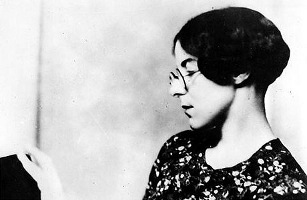
Sylvia Nora Townsend Warner was an English novelist, poet and musicologist, known for works such as Lolly Willowes, The Corner That Held Them, and Kingdoms of Elfin.
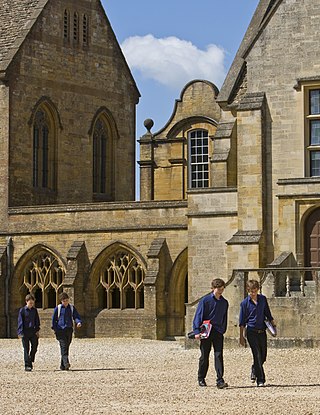
Sherborne School is a 11–18 boys public school and boarding school located beside Sherborne Abbey, in the parish of Sherborne, Dorset. The school has been in continuous operation on the same site for over 1,300 years. It was founded in 705 AD by St Aldhelm and, following the dissolution of the monasteries, re-founded in 1550 by King Edward VI, making it one of the oldest schools in the United Kingdom. Sherborne is one of the twelve founding member public schools of the Headmasters' and Headmistresses' Conference in 1869 and is a member of the Eton Group and Boarding Schools Association.

Esther Johnson was the English friend of Jonathan Swift, known as "Stella". Whether or not she and Swift were secretly married, and if so why the marriage was never made public, is a subject of debate.

Ethel Davis Wilson, was a Canadian writer of short stories and novels. Her works include Hetty Dorval (1947), The Innocent Traveller (1949), Swamp Angel (1954) and Mrs Golightly and Other Stories (1961).
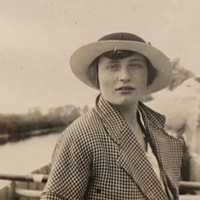
Joanna Maxwell Cannan was an English writer of pony books and detective novels, the former aimed mainly at children. She belonged to a family of prolific writers.

Dorothy Emily Stevenson was a best-selling Scottish writer. She published more than 40 "light romantic novels" over a span of more than 40 years.
Arthur Waugh was an English author, literary critic and publisher. He was the father of the authors Alec Waugh and Evelyn Waugh.
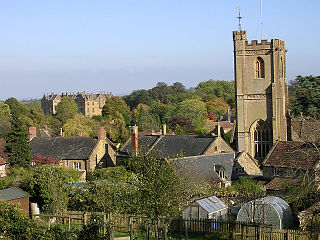
Catharine Edith Philippa Powys was a British novelist and poet, and a member of one of the most distinguished families in modern literature.
Persephone Books is an independent publisher based in Bath, England. Founded in 1999 by Nicola Beauman, Persephone Books reprints works largely by women writers of the late 19th and 20th century, though a few books by men are included. The catalogue includes fiction and non-fiction. Most books have a grey dustjacket and endpaper using a contemporaneous design, with a matching bookmark.
Eleanor Graham was a book editor and children's book author.
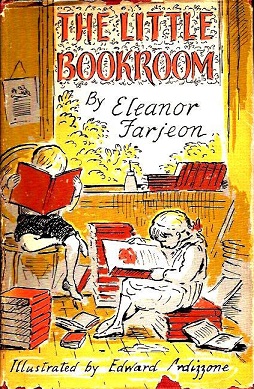
The Little Bookroom is a collection of twenty-seven stories for children by Eleanor Farjeon, published by Oxford University Press in 1955 with illustrations by Edward Ardizzone. They were selected by the author from stories published earlier in her career. Most were in the fairy tale style.
Margaret Elizabeth Jenkins was an English novelist and biographer of Jane Austen, Henry Fielding, Lady Caroline Lamb, Joseph Lister and Elizabeth I. Elizabeth Bowen said Jenkins was "among the most distinguished living English novelists."

Wolf Solent is a novel by John Cowper Powys (1872–1963) that was written while he was based in Patchin Place, New York City, and travelling around the US as a lecturer. It was published by Simon and Schuster in May 1929 in New York. The British edition, published by Jonathan Cape, appeared in July 1929. This, Powys's fourth novel, was his first literary success. It is a bildungsroman in which the eponymous protagonist, a thirty-five-year-old history teacher, returns to his birthplace, where he discovers the inadequacy of his dualistic philosophy. Wolf resembles John Cowper Powys in that an elemental philosophy is at the centre of his life and, because, like Powys, he hates science and modern inventions like cars and planes, and is attracted to slender, androgynous women. Wolf Solent is the first of Powys's four Wessex novels. Powys both wrote about the same region as Thomas Hardy and was a twentieth-century successor to the great nineteenth-century novelist.
William Beauchamp Wildman (1852-1922) was a British teacher and historian. He taught at Westminster School, Sherborne School, and was Headmaster at Abbey House from 1893 until 1908.
References
- ↑ "Elizabeth Myers". Persephone Books. Retrieved 2023-10-20.
- 1 2 3 "Littleton Charles Powys (1874-1955)". The Old Shirburnian Society. 2020-05-10. Retrieved 2023-10-20.
- 1 2 3 "Elizabeth Myers". eveningnews.atwebpages.com. Retrieved 2023-10-20.
- ↑ "A Well Full of Leaves". Persephone Books. Retrieved 2023-10-20.
- 1 2 "Elizabeth Myers (1912-1947)". The Old Shirburnian Society. 2023-05-25. Retrieved 2023-10-20.